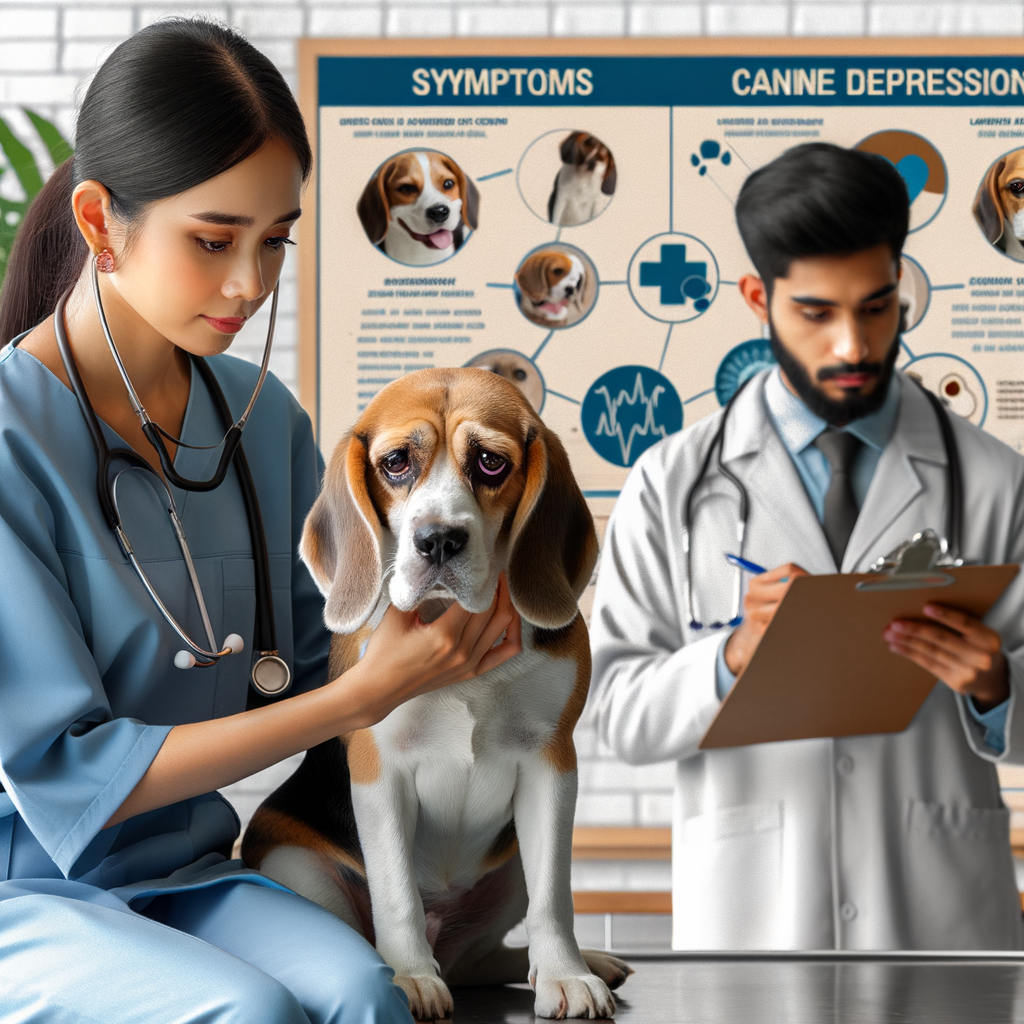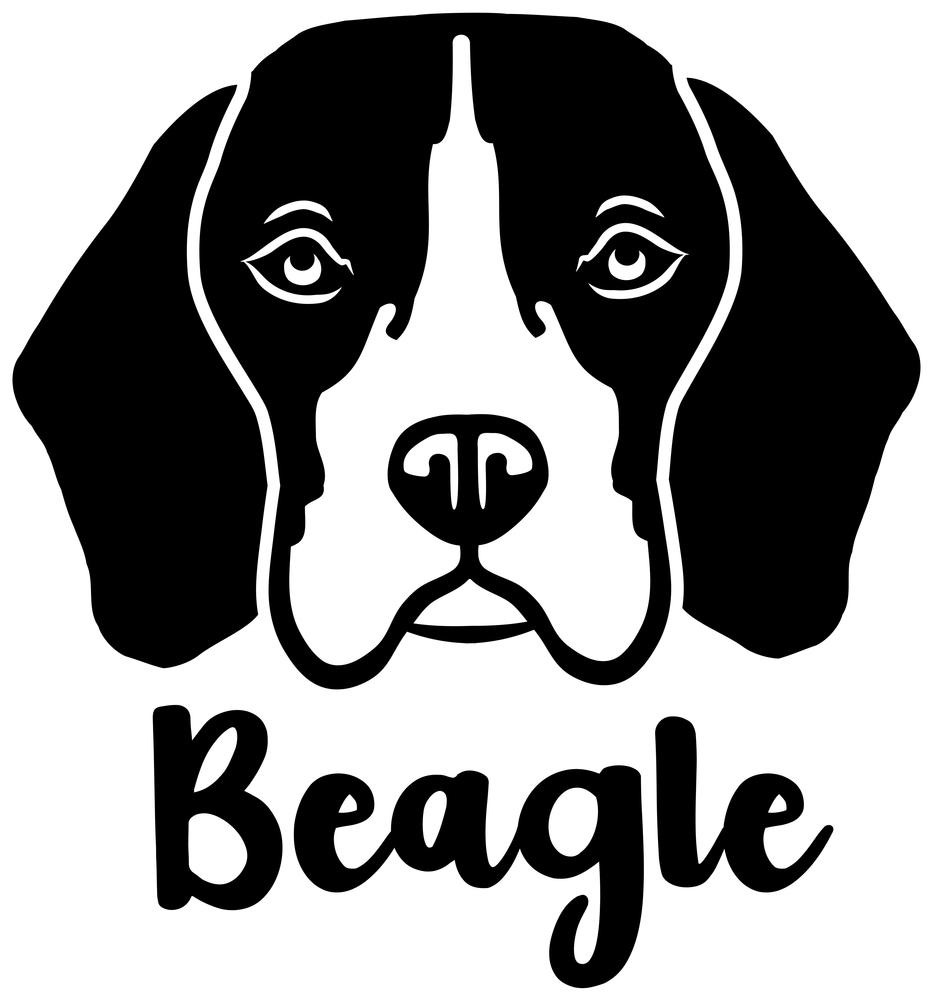
Introduction to Canine Depression
Just like humans, dogs can also experience feelings of sadness and depression. This is a reality that many pet owners may not be aware of. In this section, we will delve into the concept of canine depression and the importance of mental health in dogs.
- Understanding the concept of Canine Depression
- Importance of Canine Mental Health
Canine depression is a condition where a dog exhibits signs of distress and sadness that persist for a long period. It’s not just about a bad day or a momentary mood swing. It’s a serious condition that can significantly impact a dog’s quality of life. This condition can be triggered by various factors such as changes in the environment, loss of a loved one, or physical illness.
Mental health is as important in dogs as it is in humans. A dog’s mental health affects its behavior, physical health, and overall quality of life. Dogs with good mental health are more likely to be active, social, and happy. On the other hand, dogs with poor mental health may show signs of depression, anxiety, and other behavioral problems. Therefore, it’s crucial for pet owners to pay attention to their dog’s mental health and seek help when necessary.
Understanding canine depression and the importance of mental health in dogs is the first step towards ensuring the well-being of our furry friends. In the following sections, we will discuss how to recognize the symptoms of dog depression and how to manage it effectively.
Recognizing Dog Depression Symptoms
Depression in dogs, just like in humans, can manifest in various ways. It’s crucial to recognize the signs early to provide your furry friend with the help they need. In this section, we will focus on Beagles, a breed known for their energetic and cheerful nature. When a Beagle becomes depressed, the change can be quite noticeable.
- Common signs of Depression in Beagles
- Change in Appetite: A depressed Beagle may lose interest in food or start overeating.
- Loss of Interest: Activities that your Beagle once enjoyed may no longer appeal to them.
- Excessive Sleep: Beagles suffering from depression tend to sleep more than usual.
- Isolation: A depressed Beagle may prefer to be alone, avoiding both human and animal companions.
- Case study: Spotting depression in a Beagle
Beagles are typically lively and sociable dogs. When they become depressed, they may exhibit the following symptoms:
These are just a few signs. If you notice any changes in your Beagle’s behavior, it’s essential to consult with a vet.
Let’s consider the case of Max, a 5-year-old Beagle. Max was always the life of the party, always ready to play and explore. However, his owner started noticing changes. Max began to eat less, spent most of his time sleeping, and showed little interest in his daily walks. Concerned, Max’s owner took him to the vet, who diagnosed Max with depression. With proper treatment and care, Max gradually returned to his old self.
Recognizing the signs of depression in your Beagle is the first step towards helping them. Remember, it’s always best to consult with a professional if you notice any changes in your dog’s behavior.
Managing Canine Depression
Depression in dogs is a serious issue that requires understanding and proper management. This is particularly true for certain breeds, such as Beagles, that may be more prone to this condition.
Understanding Beagle Depression
Beagles are known for their lively and friendly nature. However, like humans, they can also experience periods of depression. Understanding how this condition affects Beagles specifically is crucial for their overall health and happiness.
- How depression affects Beagles specifically
- Case study: Managing depression in a Beagle
Depression in Beagles can manifest in various ways. Some may show a lack of interest in activities they once enjoyed, while others may exhibit changes in appetite or sleep patterns. It’s important to note that Beagles are highly social animals. Therefore, isolation or a lack of social interaction can significantly contribute to their depressive states.
Consider the case of Max, a five-year-old Beagle. Max’s owner noticed a significant change in his behavior over a few weeks. He was less enthusiastic about walks, showed little interest in his toys, and was eating less. After consulting with a veterinarian, it was determined that Max was experiencing depression. With a combination of increased social interaction, regular exercise, and a balanced diet, Max was able to overcome his depression over time. This case highlights the importance of early detection and proper management of depression in Beagles.
In conclusion, understanding and managing depression in Beagles is crucial. It requires observation, understanding, and a commitment to their overall well-being. Remember, a happy Beagle is a healthy Beagle.
Treating Canine Depression
Depression in dogs is a serious condition that requires immediate attention. Here are three steps to help your furry friend get back to their cheerful self:
- Step 1: Recognizing the signs
- Step 2: Consulting a professional
- Step 3: Implementing a treatment plan
Just like humans, dogs can also show signs of depression. These may include loss of appetite, lack of interest in activities they once enjoyed, excessive sleeping, or a sudden change in behavior. It’s important to note that these symptoms can also be signs of other health issues, so it’s crucial to observe your dog closely.
If you notice any of the signs mentioned above, it’s time to consult a professional. A veterinarian or a certified animal behaviorist can diagnose if your dog is indeed suffering from depression. They can also rule out any other health conditions that might be causing these symptoms.
Once your dog has been diagnosed with depression, the next step is to implement a treatment plan. This could involve medication, therapy, or changes in your dog’s environment. Remember, every dog is unique, so what works for one might not work for another. It’s important to follow the treatment plan closely and monitor your dog’s progress.
Depression in dogs is a serious issue, but with the right approach, it can be managed effectively. Always remember, your dog’s mental health is just as important as their physical health.
Beagle Mental Health
Beagles, like humans, can experience a range of emotions, including happiness and sadness. It’s important to understand that mental health is as crucial for our furry friends as it is for us. In this section, we will focus on preventing depression in Beagles and maintaining their mental health.
Preventing Depression in Beagles
Depression in Beagles can be prevented with the right care and attention. Let’s look at some key takeaways and activities that can help maintain your Beagle’s mental health and boost their mood.
- Key takeaways for maintaining Beagle mental health
- Examples of activities to boost Beagle mood
Understanding your Beagle’s needs and behavior is the first step towards maintaining their mental health. Regular exercise, a balanced diet, and plenty of love and attention can go a long way in keeping your Beagle happy and healthy. It’s also important to provide them with a safe and comfortable living environment. Remember, a happy Beagle is a healthy Beagle.
Beagles are energetic and playful dogs that love to explore. Activities such as walks in the park, playing fetch, or even a simple game of tug-of-war can significantly boost their mood. Mental stimulation is also crucial for Beagles. Puzzle toys, obedience training, and interactive games can keep their minds sharp and engaged. Remember, a mentally stimulated Beagle is a happy Beagle.
In conclusion, maintaining your Beagle’s mental health involves understanding their needs, providing them with plenty of physical and mental stimulation, and showering them with love and attention. By following these tips, you can help prevent depression in your Beagle and ensure they lead a happy and healthy life.
Long-term Management of Beagle Depression
Managing depression in Beagles is a long-term commitment that requires patience, understanding, and consistency. Here are three crucial steps to ensure your Beagle’s mental health is well taken care of:
- Step 1: Regular Mental Health Check-ups
- Step 2: Consistent Routine and Exercise
- Step 3: Providing a Supportive Environment
Just like humans, dogs can benefit from regular mental health check-ups. These check-ups can help identify any signs of depression early and allow for timely intervention. Veterinarians can assess your Beagle’s behavior, appetite, and overall mood to determine if there are any concerns. Regular check-ups are a proactive way to ensure your Beagle’s mental health is in good shape.
Beagles thrive on routine and physical activity. A consistent daily routine provides a sense of security and predictability, which can help alleviate feelings of anxiety and depression. Regular exercise, such as daily walks or playtime in the yard, can also boost your Beagle’s mood. Exercise stimulates the production of serotonin, a hormone that promotes feelings of happiness and well-being.
Creating a supportive and loving environment is vital for a Beagle dealing with depression. This includes providing plenty of positive reinforcement, such as praise and treats, for good behavior. It also means ensuring your Beagle has a safe and comfortable space to rest and relax. A supportive environment can help your Beagle feel more secure and less anxious, which can significantly help manage depression.
Remember, managing depression in Beagles is not a one-time event but a continuous process. It’s important to stay patient and consistent, and most importantly, show your Beagle plenty of love and care.
Conclusion: The Importance of Recognizing and Treating Dog Depression
As we reach the end of our discussion on canine depression, it’s crucial to remember the importance of recognizing and treating this condition. Just like humans, dogs too can experience periods of sadness and depression. It’s our responsibility as pet owners to ensure their mental health is taken care of.
- Recap of Dog Depression Symptoms
- Final thoughts on Beagle Mental Health
Throughout this article, we’ve discussed various symptoms of dog depression. These include changes in appetite, sleep patterns, and behavior. Dogs may exhibit signs of lethargy, loss of interest in activities they once enjoyed, and even aggressive behavior. It’s essential to keep a keen eye on these symptoms and consult a vet if they persist.
Beagles, like any other breed, are susceptible to mental health issues. Their lively and energetic nature can be significantly dampened by depression. Hence, it’s crucial to provide them with a healthy and stimulating environment. Regular exercise, a balanced diet, and lots of love and attention can go a long way in maintaining their mental health.
In conclusion, remember that your dog’s mental health is just as important as their physical health. By recognizing the signs of depression and taking appropriate action, you can ensure your furry friend leads a happy and healthy life.





